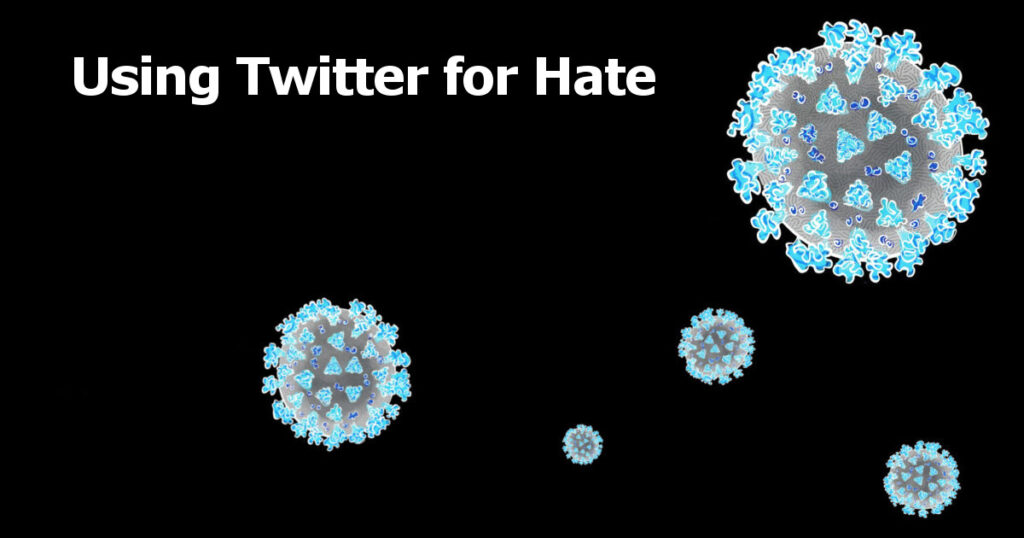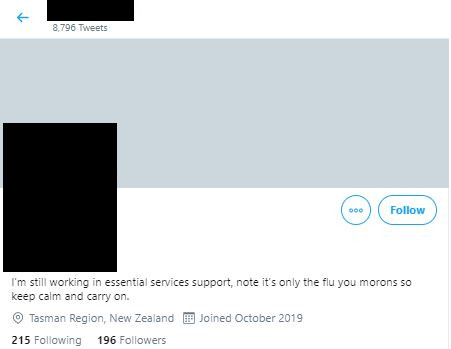
This briefing looks at examples of fake news, Islamophobia, racism, xenophobia and hate from a single Twitter user based in New Zealand. This user regularly comments on Australian news and from their language they may be an Australian citizen.
The profile was created in October 2019. It is prolific having made 9550 Tweets but has only 216 followers. Because of this it is better to report the individual tweets, rather than reporting the account which will bring up a list of all tweets in the order they were made – most recent first.
Example 1: Their profile
On their profile this user writes, “note it’s only the flu you morons so keep calm and carry on”. This is an example of dangerous misinformation. As the ABC explains, COVID-19 is “more contagious, more deadly and has more potential to overwhelm the health system” than flu. The fact they make this statement while claiming they work in “essential services support”, whether true or not, further exacerbates this misinformation.

Example 2
This is an anti-Asian message warning people to “beware” of wanting “Asian scum immigrants”.

Example 3
This one attacks international students calling them “infiltrators”. It links to a news article about the loss of revenue to Sydney University as a result of the Coronavirus.

Example 4
This is a comment on news about a crime in Melbourne, where a woman was attacked by a man on a bus after she asked him not to put his feet on the seats.
The article says, “the man is described as being of African appearance, aged 30-40, 175cm tall with black afro-like hair with short sides and a comb in it, a beard and diamond earrings.”
The Twitter user comments, “Usual suspects, religion of peace yea right”. This is an effort to blame Muslims for the attack despite there being nothing in the article at all suggesting the religion of the attacker.

Example 5
The idea of blaming a community, specifically the Muslim community, for the actions of one individual appears again. In this example they write, “Usual suspects and don’t you just love diversity folks??” as they share a Twitter from a Polish far right account.
The tweet they shared says “Australian police officer has enough of migrant woman who keeps spitting on him” and a video of the incident.
The incident is real and fairly recent. The woman is Muslim but none of the articles say she is an immigrant (as the Polish tweet alleges). The comments about “usual suspects” is an effort to blame all Muslims for this behavior while the “love diversity” is a very common (and sarcastic) Islamophobic narrative. It is usually used in the context of saying how wonderful diversity is after an Islamist terrorist attack. We see it regularly in the Counter Jihad movement where’s its purpose is to support banning Muslims.

This story made the rounds through the Counter Jihad movement on social media and on Counter Jihad blogs internationally.
The facts alleged by police when she appeared before the court were: She ran a red light and was asked to pull over. Instead of stopping, she sped away, driving at twice the speed limit. Then she got caught in traffic and police caught up to her and told her she was under arrest and to step outside the vehicle. She refused. They physically removed her from the vehicle. She resisted arrest and was swearing and spitting at officers. She claimed she was going to get tested for COVID-19 as she was spitting at them. She has been charged with driving while her license was suspended, dangerous driving, driving more than 56 km/h above the speed limit, and assaulting a police officer.
Analysis
The examples show how this relatively new Twitter account is being used to spread Islamophobia, Xenophobia against international students and racism again Asians. This New Zealand based user is intentional pushing hate on content related to Australia. It highlights how some build an online infrastructure to promote hate and once established, can readily switch between targets of convenience.
This briefing has been prepared by Dr Andre Oboler, CEO of the Online Hate Prevention Institute, and Osiris Parikh, OHPI Analyst.
Add Your Comments and Support
Comments on this briefing can be made on this Facebook post.
The Online Hate Prevention Institute is a Registered Charity that tackles all forms of online hate. You can support our work by making a donation at https://ohpi.org.au/donate/. You can also join us on Facebook, or join our mailing list.
This article is part of our special focus on Coronavirus. For the month of April, the Online Hate Prevention Institute is running a campaign Tackling Online Islamophobia. We are also currently running a fundraiser to expand our May 2020 campaign to stop online Misogyny. The full plan for our campaigns in 2020 can be seen here.
